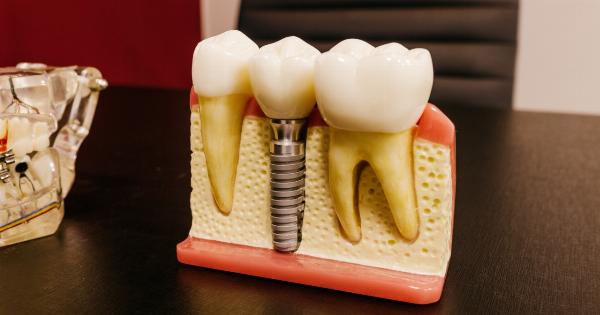Gum problems, also known as periodontal diseases, are a common condition that affects the gums and supporting structures of the teeth.
They can range from mild inflammation (gingivitis) to more serious forms like periodontitis, which can lead to tooth loss if left untreated. While there are various conventional treatments available for gum problems, natural remedies can also be effective in promoting gum health and preventing further complications.
In this article, we will explore some natural ways to treat gum problems and improve oral hygiene.
1. Maintain a Consistent Oral Hygiene Routine
The first step in naturally treating gum problems is to maintain a consistent oral hygiene routine. This includes brushing your teeth at least twice a day with a soft-bristled toothbrush and fluoride toothpaste.
Be sure to brush along the gumline to remove any plaque and bacteria that may contribute to gum problems.
2. Use Saltwater Rinse
Another effective natural remedy for gum problems is using a saltwater rinse. Mix half a teaspoon of salt in a glass of warm water and swish it around your mouth for 30 seconds.
Saltwater helps reduce inflammation, promotes healing, and kills bacteria in the mouth.
3. Apply Aloe Vera Gel
Aloe vera gel has antibacterial and anti-inflammatory properties, making it a soothing and effective remedy for gum problems. Apply a small amount of aloe vera gel directly onto the affected gums and massage gently.
Leave it on for a few minutes before rinsing your mouth with water.
4. Try Oil Pulling
Oil pulling is an ancient Ayurvedic practice that involves swishing oil around in your mouth to remove toxins and bacteria. Coconut oil, sesame oil, and sunflower oil are commonly used for oil pulling.
Swish a tablespoon of oil in your mouth for about 15-20 minutes, then spit it out and rinse your mouth thoroughly. Oil pulling can help reduce plaque buildup, improve gum health, and freshen your breath.
5. Increase Vitamin C Intake
Vitamin C plays a crucial role in maintaining healthy gums. It promotes collagen production, which helps strengthen the gum tissues. Include foods rich in vitamin C, such as citrus fruits, strawberries, kiwi, bell peppers, and leafy greens, in your diet.
You can also consider taking a vitamin C supplement after consulting with your healthcare provider.
6. Chew on Clove
Clove has natural analgesic and antiseptic properties that can help alleviate gum pain and reduce inflammation. Chew on a clove or apply clove oil onto the affected gums for relief.
However, it’s important to note that clove oil should be used in small amounts as it can cause irritation if used excessively.
7. Drink Green Tea
Green tea contains antioxidants known as catechins, which help reduce inflammation and fight bacteria in the mouth. Make a habit of drinking a few cups of green tea daily to promote gum health and prevent gum problems.
8. Maintain a Balanced Diet
A balanced diet is essential for overall oral health. Limit your consumption of sugary and acidic foods, as they can contribute to gum problems and tooth decay.
Instead, opt for a diet rich in fruits, vegetables, lean proteins, and whole grains to ensure you receive the necessary nutrients for healthy gums.
9. Use Tea Tree Oil
Tea tree oil is a natural antiseptic and antimicrobial agent known for its ability to fight bacteria in the mouth. You can make a homemade mouthwash by adding a few drops of tea tree oil to a glass of water.
Rinse your mouth with this solution a few times a day to help combat gum problems.
10. Get Regular Dental Check-ups
While natural remedies can be beneficial, visiting your dentist regularly is essential for maintaining good oral health. Dentists can identify and treat any underlying gum problems before they worsen.
They can also provide professional cleanings to remove plaque and tartar buildup, reducing the risk of gum problems.
By incorporating these natural remedies and maintaining good oral hygiene practices, you can aid in treating gum problems and promoting gum health.
However, it’s important to consult with your dentist or healthcare provider before trying any new remedies, especially if you have existing gum problems or underlying medical conditions.






























